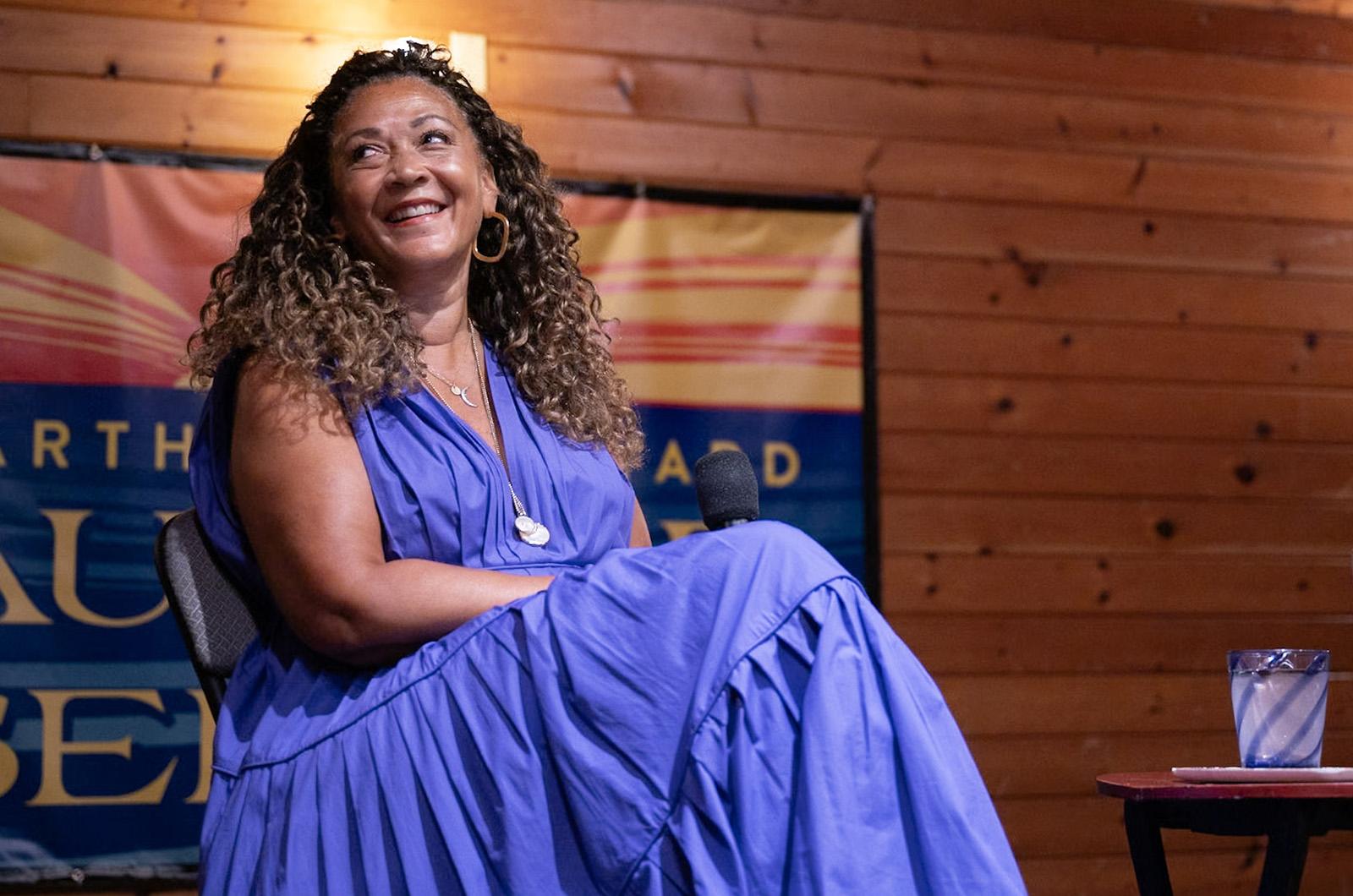Next to NPR journalist Michele Norris’s front door in her Washington D.C. home is a photo of her family, smiling on the shores of Lambert’s Cove.
Ms. Norris told the audience at the final author talk of the Martha’s Vineyard Author Series that the photograph’s purpose is not to spread cheer, but rather to serve as a safety mechanism. In the event that a police officer knocks on their door, Ms. Norris wanted the picture to prove that a loving Black family lived in the house.
In a wide-ranging conversation with television producer and screenwriter Shonda Rhimes on Sunday evening, Ms. Norris, a summer resident on the Vineyard, talked about her most recent book, her experiences as a Black woman, and her work to learn about how people from all walks of life experience race.
Fourteen years ago, Ms. Norris started The Race Card Project which asked people from all over the world to write six words on a postcard about their personal attitudes on race. She has collected close to a million postcards from all 50 states and over 100 countries since the start of the project.
In January, Ms. Norris released her book, Our Hidden Conversations, which digs into the stories behind memorable submissions and initiates transformative dialogue about race and identity.
“I thought, I have to do something to make people lean into conversation,” Ms. Norris said.
Ms. Norris told the audience that her family was a major inspiration for the project. Her mother was a mail sorter for the U.S. postal service, where her Dad also worked for many years.
“My mother was thrilled I was supporting the U.S. postal service,” Ms. Norris said.
Members of her family, seated in the front row, laughed in recognition at the comment.
When asked to talk about specific postcards, Ms. Norris recalled one she said broke her heart upon reading it. The card said: “Black babies cost less to adopt”.
While Ms. Norris said she was not able to track down the woman who wrote the postcard, she researched the nation’s adoption system and wrote a chapter of the book dedicated to those six words. She outlined how the adoption system charges the most money
for blond, white children and the least for Black boys.
“The adoption process was basically holding a mirror up to all of us and saying ‘this is what you think of your children and this is how you rate them,’” Ms. Norris said.
She interviewed a family who had gone through the adoption process, a mother who had given her children up and a nanny who all shed light on the issue. Their honesty started essential conversations and impacted changes in the adoption industry.
Ms. Rhimes was visibly moved during the retelling of the story.
“I thought that was really powerful — the idea that even hearing [those six words] led to a story that changed the industry,” Ms. Rhimes said. “People are willing to open up to you in such intimate ways.”
Ms. Norris said she received multiple postcards saying “you’re pretty for a Black girl,” which inspired another chapter in her book.
After seeing multiple women in the audience nod their heads, Ms. Norris asked the crowd to raise their hand if they had been told something similar. Dozens of hands shot in the air.
“If I’m getting hundreds of cards, that means this is rolling off people’s tongues all the time,” Ms Norris said. “I wanted the pictures to be in the book because I wanted you to see that the people who are hearing this are pretty, period.”
When asked by an audience member about the patterns she noticed in the postcards, Ms. Norris said most came from white Americans.
“When you pick up a book about race, your expectation is that you are going to learn about people of color or it’s going to be a binary,” Ms. Norris said. “The majority of stories in this book are from white folks who have never been invited to speak about race before.”
Another pattern she noticed was that young people often write about their thoughts on race while older generations tend to detail actual experiences they faced.
“Young people are almost expected to have an opinion on race and wear it on a T-shirt and put out a hashtag,” Ms. Norris said.
Ms. Rhimes’ final question asked Ms. Norris what she would write for her own six words.
Ms. Norris had two answers.
She said when she first started the Race Card Project, her answer was, “Fool them all, not done yet.” She said she chose those words because she is a woman of color from Minnesota with a speech impediment and nobody would have expected she could have a celebrated career in journalism.
But after speaking with hundreds of people who participated in the project, so many wanting a better future for themselves and society, she felt a new group of words was a better fit.
“Still more work to be done.”








Comments
Comment policy »